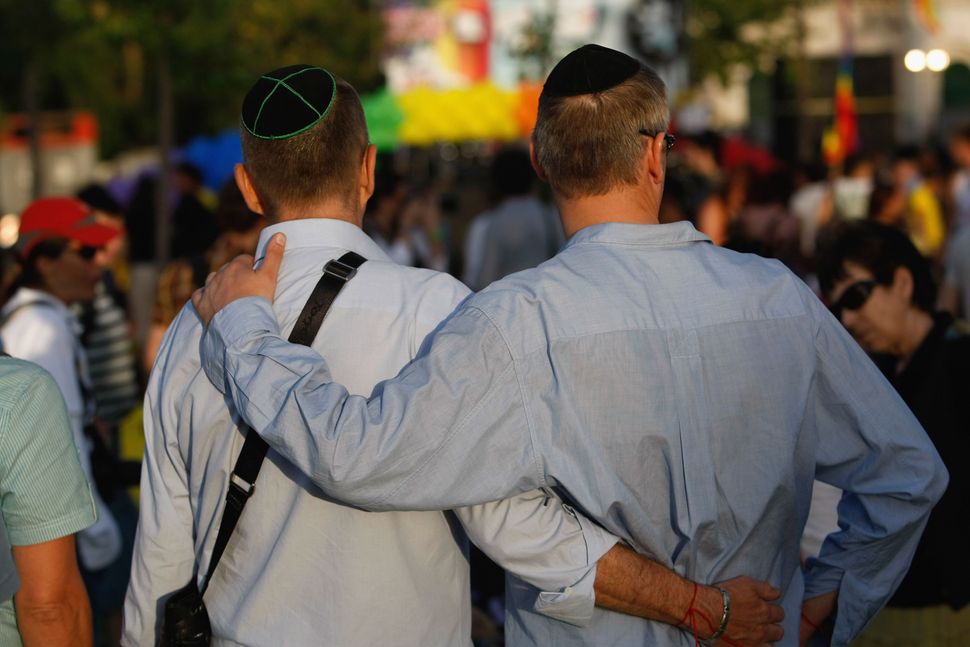What Being Gay Taught Me About Zionism

A Jewish couple take part in the annual Gay Pride parade on June 25, 2009 in Jerusalem, Israel. Thousands of LGBTQ Israelis and their supporters turned out for the heavily-secured parade, an event which has previously seen violent demonstrations by anti-gay protesters. Image by Getty Images
This Wednesday marks the 70th anniversary of Israel’s independence, which incidentally lands a week after Holocaust Remembrance Day. It’s a symbolic reminder of how far the Jewish people have come in such a short span of time. Yet seventy years later, the debate over the history of the country continues to divide people across the political spectrum and throughout the world.
Where one stands on Israel and Palestine has become a litmus test for how one is perceived in progressive movements. Excoriating any connection one might have to pro Israel activity is becoming the new norm and embracing such a view is considered part of gauging how dedicated someone is to intersectional liberal values. Look no further than the LGBT community where a group of women bearing Jewish pride flags were forcefully removed from the Chicago Dyke March last June. Organizers of the march defended their position, claiming Zionism is an “explicitly white supremacist ideology” — which would be laughable if it weren’t so disturbing.
When I came out to my family 5 years ago, I told them being gay was not so different from being Jewish. I was born Jewish and I was born gay. Neither was a choice, and I’m proud of both. The difference was that I was raised to be proud of being Jewish but ashamed of being gay. For me, Zionism is a continuation of that pride in the face of intense public scrutiny. There will always be people who insist on shaming those who embrace this cause, but it shouldn’t hinder their pride. It’s impossible to be fully Jewish while keeping one’s Jewishness inside. And for me, and many others, that includes Zionism.
As an LGBT Jew, I know firsthand how pervasive stereotypes can spread like cancer. For years the word gay was embedded with deep layers of shame and disgust. People used the word as an insult to mean someone was “perverted” or “lame.” But as more people started coming out, we reclaimed the true meaning of the term, separated from the infused animus. Likewise, the word Zionist has become falsely equated with something as repulsive as racism, expansionism, and even Nazism. Zionists are just people who support Jewish right to self-determination in the land of Israel — nothing more and nothing less. When you compare Zionists to racists, you’re speaking ill of the likes of Martin Luther King, Barack Obama, Betty Friedan, and of course, the vast majority of Jews. The more we avoid using the “Z word” the more we validate that it’s a word deserving of condemnation.
For liberal Jews (which is most of us), modern intersectionality, the belief that all social justice movements are inherently linked, forces a choice: do we side with our Zionism or our progressivism?
For me, my journey of affirming my Zionism was deeply intertwined with how I embrace my LGBT identity.
As Rabbi Michael Lerner describes in his book Embracing Israel/Palestine, “Zionism is an affirmation that Jewish is beautiful. Thus it has the same kind of appeal that Black pride and feminism have for blacks and women respectively. It insists that an oppressed group does not deserve its oppression.”
I believe in Zionism and I also believe in the rights of Palestinians to have an independent state of their own, free from occupation, which most Israelis and Palestinians actually agree on. For people who refuse to see Israel with any positive qualities, I understand their qualms. Israel’s government is deserving of legitimate criticism, but the full rejection of Israel’s right to exist is not deserving of credibility. Being Zionist doesn’t mean I give blind support to every Israeli policy any more than my American patriotism gives blind support to every President or their administration’s policies. Just as equal marriage for gay couples has no affect on the sanctity of marriage for straight couples, the existence of a Jewish state bears no threat to the existence of a future Palestinian state. Both can exist in harmony, and Zionism is perfectly compatible with Palestinian solidarity.
Seventy years have passed since Israel’s independence and in that span there are still two million fewer Jews alive today than in 1939, and anti-Semitism is entering the mainstream once again. Europe has seen a rise in bigotry and targeted violence against Jews with Britain’s Labour leader, Jeremy Corbyn becoming the face of “progressive anti-Semitism.” This resurgence of anti-Semitism is a reminder that Israel exists out of necessity and not as some sort of diplomatic favor following the Holocaust but rather as part of restoring greater justice in the world. That same justice should also extend to Palestinians in ensuring their full equality as well. For that to happen, it takes mutual responsibility from both nations with a commitment to making peace.
I hope one day we can cheer on Palestine’s independence Day alongside Israel’s. Even as peace remains elusive, one thing is certain: neither a Palestinian state nor a Jewish state can be a real success without the other, and that’s an ideal we should all hold onto.

















